高一英语必修一定语从句汇总
高一英语必修一定语从句汇总
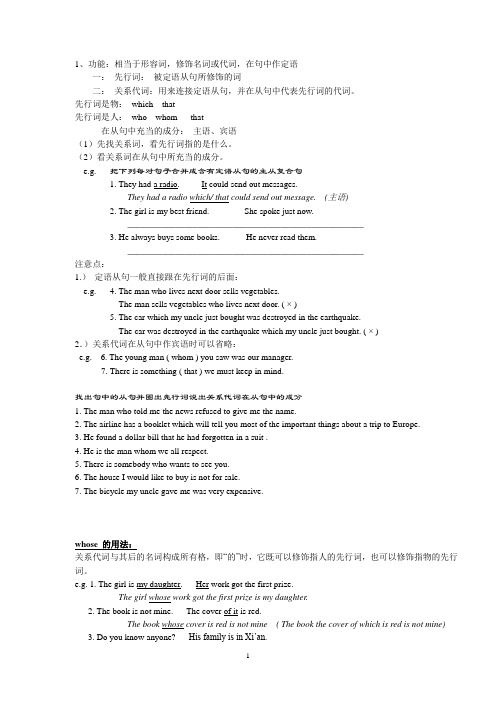
1、功能:相当于形容词,修饰名词或代词,在句中作定语一:先行词:被定语从句所修饰的词二:关系代词:用来连接定语从句,并在从句中代表先行词的代词。
先行词是物:which that先行词是人:who whom that在从句中充当的成分:主语、宾语(1)先找关系词,看先行词指的是什么。
(2)看关系词在从句中所充当的成分。
e.g. 把下列每对句子合并成含有定语从句的主从复合句1. They had a radio. It could send out messages.They had a radio which/ that could send out message. (主语)2. The girl is my best friend. She spoke just now.______________________________________________________3. He always buys some books. He never read them.______________________________________________________注意点:1.)定语从句一般直接跟在先行词的后面:e.g. 4. The man who lives next door sells vegetables.The man sells vegetables who lives next door. ( × )5. The car which my uncle just bought was destroyed in the earthquake.The car was destroyed in the earthquake which my uncle just bought. ( × )2.)关系代词在从句中作宾语时可以省略:e.g. 6. The young man ( whom ) you saw was our manager.7. There is something ( that ) we must keep in mind.找出句中的从句并圈出先行词说出关系代词在从句中的成分1. The man who told me the news refused to give me the name.2. The airline has a booklet which will tell you most of the important things about a trip to Europe.3. He found a dollar bill that he had forgotten in a suit .4. He is the man whom we all respect.5. There is somebody who wants to see you.6. The house I would like to buy is not for sale.7. The bicycle my uncle gave me was very expensive.whose 的用法:关系代词与其后的名词构成所有格,即“的”时,它既可以修饰指人的先行词,也可以修饰指物的先行词。
定语从句高一知识点总结
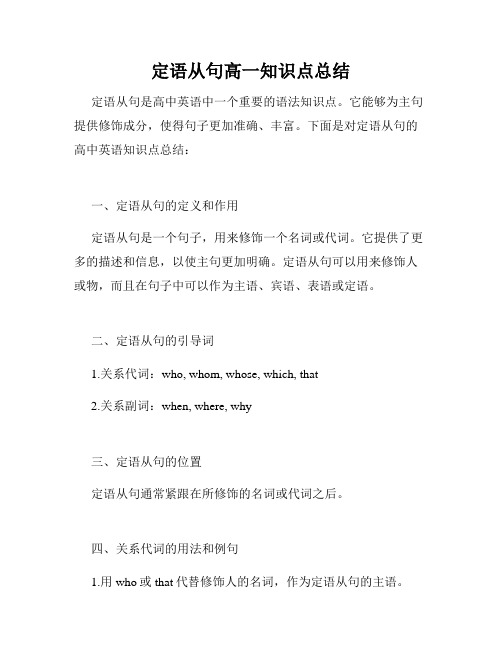
定语从句高一知识点总结定语从句是高中英语中一个重要的语法知识点。
它能够为主句提供修饰成分,使得句子更加准确、丰富。
下面是对定语从句的高中英语知识点总结:一、定语从句的定义和作用定语从句是一个句子,用来修饰一个名词或代词。
它提供了更多的描述和信息,以使主句更加明确。
定语从句可以用来修饰人或物,而且在句子中可以作为主语、宾语、表语或定语。
二、定语从句的引导词1.关系代词:who, whom, whose, which, that2.关系副词:when, where, why三、定语从句的位置定语从句通常紧跟在所修饰的名词或代词之后。
四、关系代词的用法和例句1.用who或that代替修饰人的名词,作为定语从句的主语。
例句:The boy who is reading in the library is my brother.2.用whom或that代替修饰人的名词,作为定语从句的宾语。
例句:The girl whom you met yesterday is my best friend.3.用which或that代替修饰物的名词,作为定语从句的主语或宾语。
例句:The book which I borrowed from the library is very interesting.4.用whose表示所修饰名词的所有关系。
例句:The man whose car was stolen reported it to the police.五、关系副词的用法和例句1.用when表示时间,修饰修饰时间的名词,作为定语从句的状语。
例句:Yesterday was the day when we won the championship.2.用where表示地点,修饰修饰地点的名词,作为定语从句的状语。
例句:Do you remember the place where we had our first date?3.用why表示原因,修饰修饰原因的名词,作为定语从句的状语。
高一英语必修一unit4定语从句

Do you know the girl in our class? Her hair is very short. Do you know the girl whose hair is very short in our class? He is the student. I broke his pencil yesterday. He is the student whose pencil I broke yesterday.
refere
nce
(4) 先行词是who或which引导的主句。 Who is the girl that drove the car? Who that broke the window will be punished? Which is the T-shirt that fits me most? Who is the man that is reading the newspaper over there?
• Mr. Turner is an artist. • She became a lawyer.
主系表
主谓双宾 主谓双宾 主谓宾宾补
• He gave his sister a book.
• I'll write you a long letter.
• I found the book easy. • I'll let him go.
refere
nce
that和which在指物的情况下一般都 可以互换,但在下列情况下,一般用 that而不用which。
(1) 限制性定语从句中先行词为all, everything, anything, nothing, none, few, little, some等不定代词指物时。 (something用that或which均可) Have you taken down everything that Mr. Li said? There seems to be nothing that is impossible to him in the world.
高中英语人教必修一Unit1-5定语从句整理

Unit 1-5定语从句整理Unit 1:1.Do you want a friend whom you could tell everything to (=to whom you could tell everything)?2.There was a time when a deep blue sky, the song of the birds, moonlight and flowers could never have kept me spellbound.3. It was the first time in a year and a half that (=when) I had seen the night face to face.4. I am only able to look at nature through dirty curtains hanging (=which hang)before very dusty windows.Unit 2:1. At first the English spoken(=which was spoken)in England was very different from the English spoken today.2. English became less like German because those who ruled (=ruling)England spoke first Danish and later French.3. Today the number of people learning (=who learn) English in China is increasing rapidly.4. Many people believe the English spoken (=which is spoken) on TV and the radio is standard English.5. Those who reported (=reporting) the news were expected to speak excellent English.6. However, on TV and the radio you will hear differences in the way(that/ in which) people speak.7. Some people who live (=living) in the mountains of the eastern USA speak with an older kind of English dialect.8. The USA is a large country in which (=where) many different dialects are spoken.Unit 3:1. They are Dai and grew up in western Yunnan Province near the Lancang River, the Chinese part of the river that is called (=called) the Mekong River in other countries.2. We found a large atlas with good maps that showed (=showing) details of world geography.3. It makes wide bends or meanders through low valleys to the plains where (=in which) rice grows.4. Along the way children dressed (=who were dressed) in long wool coats stopped to look at us.5. We will reach Dali in Yunnan Province soon, where (=in which) our cousins will join us.Unit 4:1. It was a night (that/ when/ at which)the earth didn’t sleep.2. But the one million people of the city, who thought little of these events, were asleep as usual that night.3. It was felt in Beijing, which (=and it) is more than two hundred kilometers away.4. A huge crack that (=which) was eight kilometres long and thirty metres wide cut across houses, roads and canals.5. The number of people who were killed or seriously injured reached more than 400,000.6. Later that afternoon, another big quake which (=that)was almost as strong as the first one shook Tangshan.7. The army organized teams to dig out those who were trapped and to bury the dead.8. Workers built shelters for survivors whose homes had been destroyed.9. Your speech was heard by a group of five judges, all of whom (=and all of them) agreed that it was the best one this year.10. Next month the city will open a new park to honour those who died in the terrible disaster.11. The park will also honour those who helped the survivors.12. As you know (=As is known), this is the day(that/when/on which) the quake happened eight years ago.Unit 5:1. The time when (=that) I first met Nelson Mandela was a very difficult period of my life.2. Mandela was the black lawyer to whom I went for advice (=whom I went to for advice).3. He was generous with his time, for which I was grateful (=which I was grateful for).4. The school where (=in which) I studied for only two years was three kilometres away.5. However, this was a time when one had got to have a passbook to live in Johannesburg.6. The day when (=that/ on which) Nelson Mandela helped me was one of my happiest.7. Until today we have reached a stage where (=in which) we have almost no rights at all.8. The parts of town in which (=where) they had to live were decided by white people.9. The places outside the towns where (=in which) they were sent to live were the poorest parts of South Africa.10. We were put into a position in which (=where) we had either to accept we were less important, or fight the government.11. We first broke the law in a way which (=that) was peaceful.12. It was a prison from which no one escaped (=which no one escaped from).13. Mr Mandela began a school for those of us who had little learning.14. He taught us during the lunch breaks and the evenings when (=that)we should have been asleep.15. We read books under our blankets and used anything (that) we could find to make candles to see the words.16. I felt bad the first time (that/ when) I talked to a group.17. I remembered the beatings and the cruelty of the guards and my friends who had died.。
高一必修一语法定语从句全面讲解
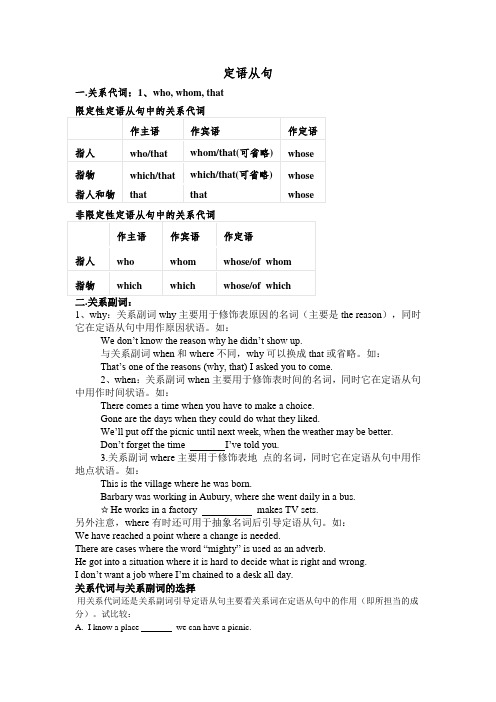
定语从句一.关系代词:1、who, whom, that三.辨析限制性与非限制性定语从句:1.China, which was founded in 1949, is becoming more and more powerful.2.The teacher told me that Tom was the only person that I could depend on. 。
3.China is a country which has a long history.4.His mother, who loves him very much, is strict with him.5.In the street I saw a man who was from Africa.st summer I visited the People’s Great Hall, in which many important meetings are held every year.四.限制性定语从句中只能用that 引导定语从句的情况1.当先行词是everything, anything, nothing ,something , all, none, few, little, some等不定代词时,或当先行词受every, any, all, some, no, little, few, much等代词修饰时。
如:There seems to be nothing that is impossible to him in the world.All that can be done has been done.He stayed in the library and looked up any information that they needed. 。
注意:当先行词指人时,偶尔也可用关系代词who,如:Any man that / who has a sense of duty won’t do such a thing.2.当先行词被序数词修饰时。
英语语法高中定语从句知识点归纳总结
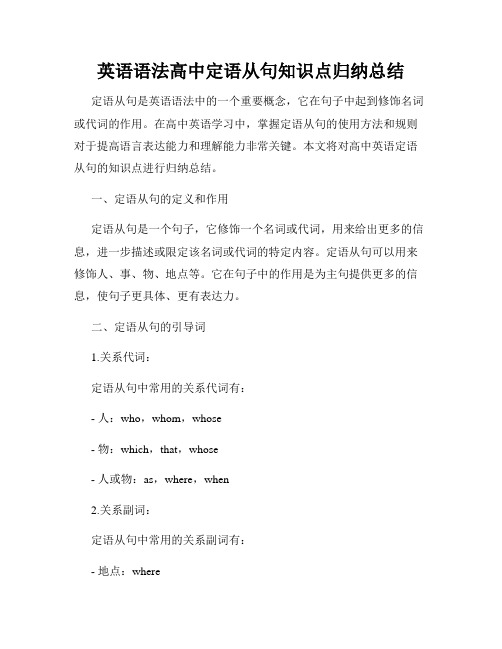
英语语法高中定语从句知识点归纳总结定语从句是英语语法中的一个重要概念,它在句子中起到修饰名词或代词的作用。
在高中英语学习中,掌握定语从句的使用方法和规则对于提高语言表达能力和理解能力非常关键。
本文将对高中英语定语从句的知识点进行归纳总结。
一、定语从句的定义和作用定语从句是一个句子,它修饰一个名词或代词,用来给出更多的信息,进一步描述或限定该名词或代词的特定内容。
定语从句可以用来修饰人、事、物、地点等。
它在句子中的作用是为主句提供更多的信息,使句子更具体、更有表达力。
二、定语从句的引导词1.关系代词:定语从句中常用的关系代词有:- 人:who,whom,whose- 物:which,that,whose- 人或物:as,where,when2.关系副词:定语从句中常用的关系副词有:- 地点:where- 时间:when- 原因:why三、定语从句的基本结构定语从句的基本结构为:关系代词/副词 + 主句。
其中,关系代词或副词在定语从句中担任主语、宾语、表语或定语的作用。
四、定语从句的几个常见类型1.限制性定语从句:限制性定语从句用来对先行词进行进一步的限定,它的信息是先行词不可或缺的一部分。
限制性定语从句与主句之间没有逗号隔开,通常使用关系代词that,也可使用which或who。
例子:The book that you borrowed from me is very interesting.你从我这里借的那本书非常有趣。
2.非限制性定语从句:非限制性定语从句用来对先行词进行附加说明,它的信息只是对先行词的附加补充,可以省略而不影响句子的整体意思。
非限制性定语从句与主句之间用逗号隔开,通常使用关系代词which,也可使用who。
例子:The weather, which was sunny and warm, made our picnic very enjoyable.天气晴朗温暖,使得我们的野餐非常愉快。
高一英语语法定语从句归纳总结

高一英语定语从句的归纳一.几个基本概念1.定语从句的定义:用作定语的从句叫定语从句。
2.先行词:被定语从句所修饰的名词或代词。
3.定语从句的位置:紧跟先行词(名词或代词)之后。
4.引导词:引导定语从句的词(包括关系代词和关系副词)。
﹙1﹚关系代词:that/who/whom/which/as﹙2﹚关系副词:when/where/why5.引导词的位置:位于定语从句之前(先行词之后)。
【as除外】6.引导词的功能(作用):﹙1﹚连接先行词和定语从句。
﹙2﹚在定语从句中充当一定的成分(关系代词充当主语或宾语,关系副词充当状语)。
7.定语从句的类型:﹙1﹚限定性定语从句(主句和定语从句之间无逗号)。
①直接由引导词引导定语从句The man who you’re talking to is my friend.②由介词+关系代词(whom/which)引导The man to whom you’re talking is my friend.I need a pen with which I can write a letter.=I need a piece of paper on which I can write a letter.介词的选用可根据从句中的相关词组确定,该介词通常可以放在关系代词之前,也可放在从句之尾。
例如:The man (who/whom/that) I talked about at the meeting is from Beijing University.=The man about whom I talked at the meeting is from Beijing University.The palace (which/that) I often pay a visit to was built in the 17th century.=The palace to which I often pay a visit was built in the 17th century.﹙2﹚非限定性定语从句(主句和定语从句之间用逗号隔开)。
高中英语必修一 unit 4 定语从句

1.当先行词被such/so/the same修饰时,用as 引导定语从句,在从 句中作主语或宾语。2.as引导非限制性定语从句,代替整个句
子或一件事,意为“正如,就像...”
11. It is the most interesting story that I have ever read.
1. Carol said the work would be done by October, which personally I doubt very mwuchhic. h引导非限制性定语从句,有时代指前面整个句子 2. Her bag, in which she put all her money, has been stolen. 3. The student to whom we were talking just now is the best student in our class. 4. Your speech was heard by a group of five judges, all ofwhomagreed that it was the best one this year.
既可指人表示“某人的”,也可指物,表示“某物的”
7. As you know, this is the day the quake happened 40 years ago.
8. This is so interesting a book as we all like.
9. Mandela is such a great black leader as we all admire very much.
介词之后的关系代词,指物ents allowed Ann to help John whose family was poor. 6. Yesterday Iwrheocsei是vewdhao的pa所rc有el格w,h在o从se句w中ei作gh定t w语a,s后v接er名y l词ig。ht.
高一定语从句知识点的整理总结、专项训练题目
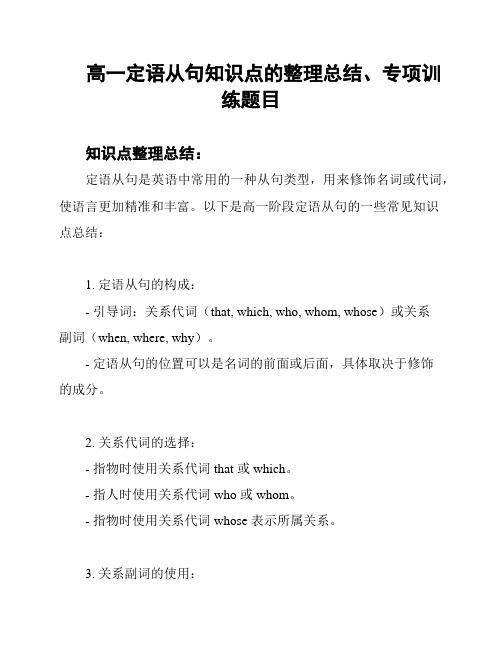
高一定语从句知识点的整理总结、专项训练题目知识点整理总结:定语从句是英语中常用的一种从句类型,用来修饰名词或代词,使语言更加精准和丰富。
以下是高一阶段定语从句的一些常见知识点总结:1. 定语从句的构成:- 引导词:关系代词(that, which, who, whom, whose)或关系副词(when, where, why)。
- 定语从句的位置可以是名词的前面或后面,具体取决于修饰的成分。
2. 关系代词的选择:- 指物时使用关系代词 that 或 which。
- 指人时使用关系代词 who 或 whom。
- 指物时使用关系代词 whose 表示所属关系。
3. 关系副词的使用:- where 表示地点。
- when 表示时间。
- why 表示原因。
4. 定语从句的省略:- 当关系代词在定语从句中作宾语且不作介词宾语时,可以省略。
5. 定语从句的限制性和非限制性:- 限制性定语从句对所修饰的名词起限定作用,不可省略。
- 非限制性定语从句对所修饰的名词作补充说明,用逗号隔开,一般可省略。
专项训练题目:1. 下列句子中有定语从句的是:- A. The book on the table is mine.- B. This is the pen that I lost yesterday.- D. The boy is tall.2. 选择正确的关系代词填空:- The house _______ you bought is very beautiful.- A. where- B. that- C. who3. 选择正确的关系副词填空:- Do you remember the day ______ we went to the beach? - A. when- B. who- C. why4. 下列句子中哪个是限制性定语从句:- A. My brother, who is a doctor, lives in Paris.- B. The dog that I adopted is very friendly.- C. The house, where we spent our vacation, is now on sale.5. 填入合适的关系代词或关系副词:- This is the bus _______ I often take to work.- A. who- B. when- C. that作答:1. B2. B3. A4. B5. C以上是高一定语从句知识点的整理总结和专项训练题目。
高一英语必修一定语从句
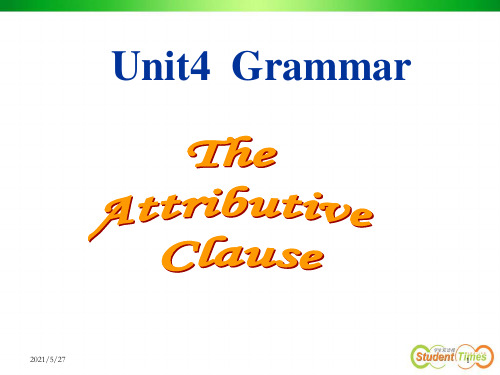
(主语)
4) The girl that we saw yesterday is Jim’s
sister. 2021/5/27
(宾语) 16
Note Ⅰ that和which在指物的情况下一般 都可以互换,但在下列情况下,一般用 that而不用which。
(1)先行词为everything, nothing, something, anything, 等 不定代词时。
2021/5/27
11
Which 在从句中作主语或宾语, 指物。
I showed him the letter.
I received it this morning. I showed him the letter (which) I received this morning.
2021/5/27
(3) 先行词被序数词或最高级修饰时。 This is the first book (that) he has read.
(4) 先行词被the only, the very, the same, the last 修饰时。
This is the very book that belongs to him.
Unit4 Grammar
2021/5/27
1
Complex sentence 复合句:
连词连接两个或多个主谓结构的句子,其中一个主谓结构是 句子的主要部分(主句),另一个或一个以上的主谓结构 只在句子中作某个成分(如主语、宾语、表语、定语、状 语、同位语)。
复合句 = 主句 + 从句(定从/主从/宾从/表从/同位从/状从)
2. We don’t know the number of people _t_h_a_t_/w__h_o__ lost their homes in 1906 earthquake.
高中英语必修一语法:定语从句的归纳

高中英语必修一语法:定语从句的归纳(最新版)编制人:__________________审核人:__________________审批人:__________________编制单位:__________________编制时间:____年____月____日序言下载提示:该文档是本店铺精心编制而成的,希望大家下载后,能够帮助大家解决实际问题。
文档下载后可定制修改,请根据实际需要进行调整和使用,谢谢!并且,本店铺为大家提供各种类型的经典范文,如教案大全、教学资料、作文大全、演讲致辞、祝福语、名言句子、感悟故事、心得体会、总结报告、工作计划、党团资料、条据书信、合同协议、其他范文等等,想了解不同范文格式和写法,敬请关注!Download tips: This document is carefully compiled by this editor.I hope that after you download it, it can help you solve practical problems. The document can be customized and modified after downloading, please adjust and use it according to actual needs, thank you!In addition, this shop provides you with various types of classic sample essays, such as teaching plans, teaching materials, essays, speeches, blessings, famous quotes, sentences, insights, experiences, summary reports, work plans, party and group information, and rules Letters, contract agreements, other sample essays, etc. If you want to know the format and writing of different sample essays, stay tuned!高中英语必修一语法:定语从句的归纳高中英语必修一语法:定语从句的归纳定语从句的归纳一.几个基本概念1.定语从句的定义:用作定语的从句叫定语从句。
高中英语语法基础 ——定语从句知识点总结归纳讲解(附同步练习)(有答案)
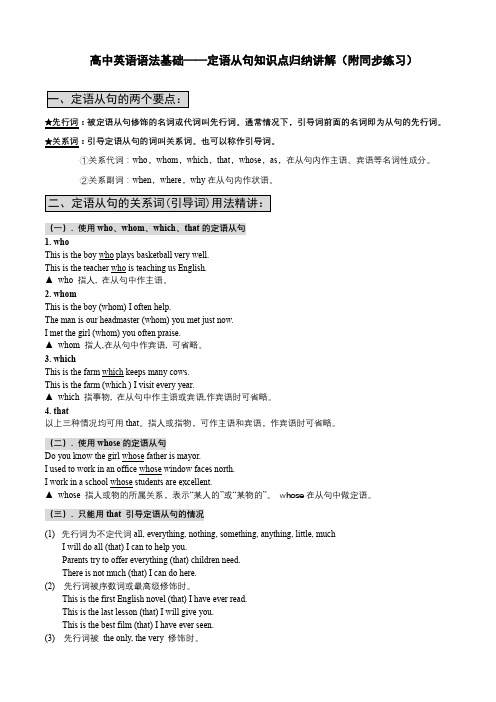
高中英语语法基础——定语从句知识点归纳讲解(附同步练习)★先行词:被定语从句修饰的名词或代词叫先行词。
通常情况下,引导词前面的名词即为从句的先行词。
★关系词:引导定语从句的词叫关系词。
也可以称作引导词。
①关系代词:who,whom,which,that,whose,as,在从句内作主语、宾语等名词性成分。
②关系副词:when,where,why在从句内作状语。
(一). 使用who、whom、which、that的定语从句1. whoThis is the boy who plays basketball very well.This is the teacher who is teaching us English.▲who 指人, 在从句中作主语。
2. whomThis is the boy (whom) I often help.The man is our headmaster (whom) you met just now.I met the girl (whom) you often praise.▲whom 指人,在从句中作宾语, 可省略。
3. whichThis is the farm which keeps many cows.This is the farm (which ) I visit every year.▲which 指事物, 在从句中作主语或宾语,作宾语时可省略。
4. that以上三种情况均可用that。
指人或指物,可作主语和宾语,作宾语时可省略。
(二). 使用whose的定语从句Do you know the girl whose father is mayor.I used to work in an office whose window faces north.I work in a school whose students are excellent.▲whose 指人或物的所属关系,表示“某人的”或“某物的”。
高中英语知识点归纳定语从句的用法
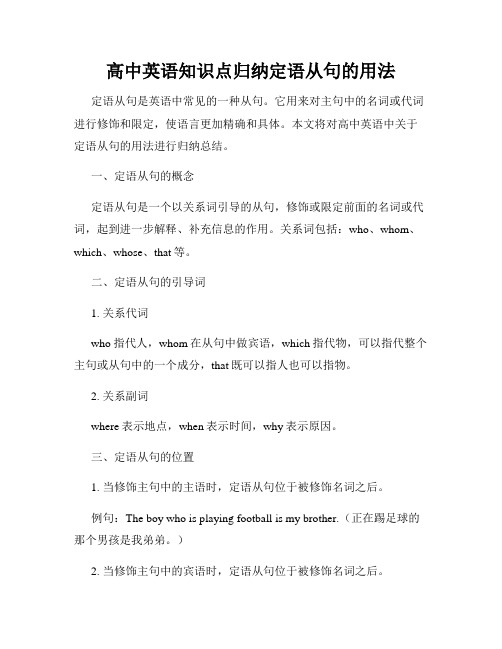
高中英语知识点归纳定语从句的用法定语从句是英语中常见的一种从句。
它用来对主句中的名词或代词进行修饰和限定,使语言更加精确和具体。
本文将对高中英语中关于定语从句的用法进行归纳总结。
一、定语从句的概念定语从句是一个以关系词引导的从句,修饰或限定前面的名词或代词,起到进一步解释、补充信息的作用。
关系词包括:who、whom、which、whose、that等。
二、定语从句的引导词1. 关系代词who指代人,whom在从句中做宾语,which指代物,可以指代整个主句或从句中的一个成分,that既可以指人也可以指物。
2. 关系副词where表示地点,when表示时间,why表示原因。
三、定语从句的位置1. 当修饰主句中的主语时,定语从句位于被修饰名词之后。
例句:The boy who is playing football is my brother.(正在踢足球的那个男孩是我弟弟。
)2. 当修饰主句中的宾语时,定语从句位于被修饰名词之后。
例句:I bought a book which was written by J.K. Rowling.(我买了一本J.K.罗琳写的书。
)3. 当修饰主句中的宾语时,定语从句位于被修饰名词之前。
例句:I saw the girl whom I met yesterday.(我看到了昨天遇到的那个女孩。
)四、限制性定语从句与非限制性定语从句1. 限制性定语从句用来对名词进行修饰和限定,如果去掉不影响主句的完整性。
被从句修饰的名词不能省略。
例句:The book that I bought yesterday is very interesting.(昨天我买的那本书非常有趣。
)2. 非限制性定语从句用来对名词进行陈述和补充说明,去掉会影响句子的意思和完整性。
被从句修饰的名词可以省略。
例句:Tom, who is a doctor, works in a hospital.(汤姆是个医生,在一家医院工作。
高一英语定语从句笔记

1关系代词(先行词在从句中充当主语或宾语时):that(人或物),which(物),who(人),whom(人)(只作宾语),whose(指代先行词的所有格,可替代人或物)2关系副词(先行词在从句中充当状语时):where(充当地点)=介词+which; when(充当时间)=介词+which; why(充当原因)=for which 3 whose cover=the cover of which=of which the coverwhose money=the money of whom=of whom the money(后两种很少用)4 介词后的关系代词只能用which指代物,用whom指代人The man to whom you spoke was a scientist.The city in which she lives is far away.5 只能用that 做关系代词的情况1) 先行词为不定代词everything,little,much,all,anything,nothing , none 等。
e.g. Finally, the thief handed everything that he had stolen.2) 先行词前有形容词最高级时,或是最高级时,用that。
e.g. This is the best book (that) I have ever read.3) 先行词被the only,the very,the last ,the same ,the just等修饰时,用that。
e.g. He is the only person that I want to see now.4) 先行词同时指人和指物时,用that。
e.g. We talked about the things and persons that we saw then.5) 先行词被序数词或the last 修饰时,e.g. He was the first person that got to the Mount Emei.6) 先行词是或被不定代词all, few, little, much, every, some, no等修饰时。
高一英语定语从句归纳整理
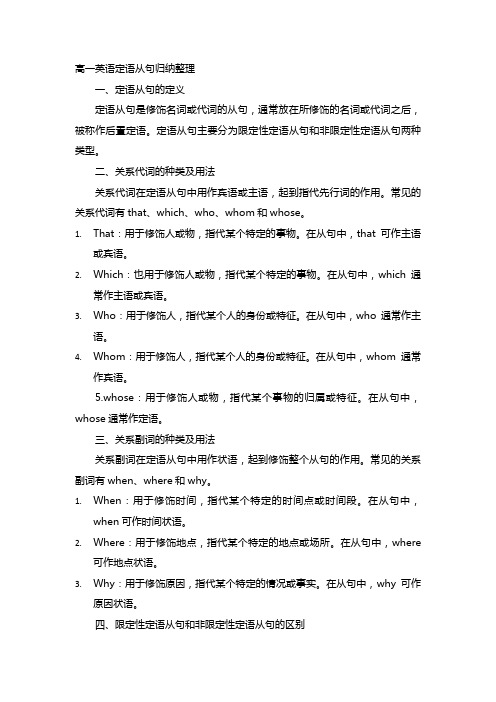
高一英语定语从句归纳整理一、定语从句的定义定语从句是修饰名词或代词的从句,通常放在所修饰的名词或代词之后,被称作后置定语。
定语从句主要分为限定性定语从句和非限定性定语从句两种类型。
二、关系代词的种类及用法关系代词在定语从句中用作宾语或主语,起到指代先行词的作用。
常见的关系代词有that、which、who、whom和whose。
1.That:用于修饰人或物,指代某个特定的事物。
在从句中,that可作主语或宾语。
2.Which:也用于修饰人或物,指代某个特定的事物。
在从句中,which通常作主语或宾语。
3.Who:用于修饰人,指代某个人的身份或特征。
在从句中,who通常作主语。
4.Whom:用于修饰人,指代某个人的身份或特征。
在从句中,whom通常作宾语。
5.whose:用于修饰人或物,指代某个事物的归属或特征。
在从句中,whose通常作定语。
三、关系副词的种类及用法关系副词在定语从句中用作状语,起到修饰整个从句的作用。
常见的关系副词有when、where和why。
1.When:用于修饰时间,指代某个特定的时间点或时间段。
在从句中,when可作时间状语。
2.Where:用于修饰地点,指代某个特定的地点或场所。
在从句中,where可作地点状语。
3.Why:用于修饰原因,指代某个特定的情况或事实。
在从句中,why可作原因状语。
四、限定性定语从句和非限定性定语从句的区别1.限定性定语从句:限定性定语从句与主句的关系十分紧密,缺之不可,对先行词起限定、修饰的作用。
如果将其去掉,会影响句子完整性,甚至意义不明。
限定性定语从句的先行词前面不可加其他定语修饰词,并且不用逗号隔开。
2.非限定性定语从句:非限定性定语从句起补充说明作用,缺少也不会影响全句的理解,它与主句之间通常用逗号隔开。
非限定性定语从句前面可以加其他定语修饰词。
非限定性定语从句先行词为专有名词或者具有特指性的名词时,一般不用that。
非限定性定语从句还可以由as引导。
人教版高中英语必修一定语从句汇总

必修一定语从句汇总1.Do you want a friend whom you could tell everything to, like your deepest feelings andthoughts? ( B1U1 P2)2.I can well that there was a time when a deep blue shy, the song of the birds, moonlight andflowers could never have kept me spellbound. ( B1U1 P2)3.For example, one evening when it was so warm…(B1U1 P2)4.With your partner, list the countries that use English as an official language. (B1U2 P9)5.It was based more on German than the English we speak at present. (B1U2 P10)6.English became less like German because those who ruled England spoke first Danish andlater French. (B1U2 P10)7.This is because in the early days of radio, those who reported the news were expected to speakexcellent English. (B1U2 P13)8.However, on TV and the radio you will hear differences in the way people speak. (B1U2P13)9.Some people who live in the mountains of the eastern USA speak with an older kind ofEnglish dialect. (B1U2 P13)10.Work in pairs and make a list of the ones you and your partner have heard. (B1U2 P13)11.Read the dialogue and circle the words that mean the same. (B1U2 P15)12.We found a large atlas with good maps that showed details of world geography. (B1U3P18)13.It makes wide bends or meanders through low valleys to the plains where rice grows. (B1U3P18)14.A glacier that flowed like a river of ice through a mountain that cut the mountains into twoparts. (B1U3 P20)15.We also discovered a river that was falling off the mountain and became a wonderful waterfall.(B1U3 P20)16.This was even more exciting to see than the rapids where the water seemed to boil. (B1U3P20)17.We will reach Dali in Yunnan Province soon, where our cousins Dao Wei and Yu Hang willjoin us. (B1U3 P22)18.Describe them and the scenery in your travel journal as if you are writing to a friend who hasnever seen them. (B1U3 P24)19.But the one million people of the city, who thought little of these events, were asleep as usualthat night. (B1U4 P26)20.It was felt in Beijing, which is more than two hundred kilometers away. (B1U4 P26)21.The number of people who were killed or injured reached more than 400,000. (B1U4 P26)22.Then, later that afternoon, another big quake which was almost as strong as the first one shookTangshan. (B1U4 P26)23.The army organized teams to dig out those who were trapped and to bury the dead. (B1U4P26)24.Workers built shelters for survivors whose homes had been destroyed. (B1U4 P26)25.Your speech was heard by a group of five judges, all of whom agreed that it was the best onethis year. (B1U4 P30)26.Next month the city will open a new park to honor those who died in the terrible disaster.(B1U4 P30)27.The park will also honor those who helped the survivors. (B1U4 P30)28.Before their trip this summer, the group hopes to collect 1 million yuan to give to the schoolswhich help the children in those natural disaster-hit areas. (B1U4 P31)29.A great person is someone who devotes his/her life to helping others. (B1U5 P33)30.The time when I first met Nelson Mandela was a very difficult period of my life. (B1U5P34)31.It was in 1952 and Mandela was the black lawyer to whom I went for advice. (B1U5 P34)32.He was generous with his time,for which I was grateful. (B1U5 P34)33.The school where I studied for only two years was three kilometers away. (B1U5 P34)34.However, this was a time when one had got to have a passbook to live in Johannesburg.(B1U5 P34)35.The day when Nelson Mandela helped me was one of my happiest. (B1U5 P34)36.The last thirty years have seen the greatest number of laws stopping our rights and progress,until today we have reached a stage where we have almost no rights at all. (B1U5 P34)37.The parts of town in which they had to live were decided by white people. (B1U5 P34)38.The places outside the towns where they were sent to live were the poorest parts of SouthAfrica. (B1U5 P34)39.…We were put into a position in which we had either to accept we were less important, orfight the government. (B1U5 P34)40.We first broke the law in a way which was peaceful; (B1U5 P34)41.It was a prison from which no one escaped. (B1U5 P38)42.Mr. Mandela began a school for those of us who had little learning. (B1U5 P38)43.He taught us during the lunch breaks and the evenings when we should have been asleep.(B1U5 P38)44.We read books under our blankets and used anything we could find to make candles to see thewords. (B1U5 P38)45.I remembered the beatings and the cruelty of the guards and my friends who had died. (B1U5P38)必修一后置定语汇总1.I’ve grown so crazy about everything to do with nature. (B1U1 P2)2.I am only able to look at nature through dirty curtains hanging before very dusty windows.(B1U1 P2)3.Today the number of people learning English in China is increasing rapidly. (B1U2 P10)4.English is one of the official languages used in India. (B1U2 P10)5.Many people believe the English spoken on TV and the radio is standard English. (B1U2P13)6.When people use words and expressions different from the “standard language.”(B1U2P13)7.Along the way children dressed in long wool coats stopped to look at us. (B1U3 P22)8.In the valleys colorful butterflies flew around us and we saw many yaks and sheep eatinggreen grass. (B1U3 P22)。
高必修一 U4 语法讲解:定语从句(关系代词)

结论3: 先行词有以下限定时,关系词只用that: 1. 先行词为不定代词 something, everything, anything, nothing, little, much, all 2. 先行词前有形容词最高级、序数词修饰时 3. 先行词被the only,the very,the last 修饰 时 This is the very book that I’m looking for. 这正是我在寻找的那本书。 4. 先行词同时指人和指物时 5. 当主句是who 或 which开头的疑问句时
1. 看定语从句中动词与介词的搭配
He is the man ___ whom you can believe. in
2. 看定语从句中形容词与介词的搭配
He gave me some books _____ which I am with not very familiar.
3. 根据先行词判断,所用的介词与先行词搭配
4. On the train I saw a girl _____ I A thought was your sister. A. who B. whom C. which D. what 5. Have you seen the film “Titanic” ____ C leading actor is world-famous? A. its B. that C. whose D. 是在句子中用来修饰名词的那个部分。 It was a snowy evening. adj当定语 The boy in blue is my good friend.介宾短语当定语 They raised money to help children eager to study. adj短语当定语 -ing短语当定语 The man standing over there wants to see you. The English spoken at that time was based more on German. P.P短语当定语 The question to be discussed tomorrow is about tax cut. -to do短语当定语 Workers built shelters for survivors whose homes had been destroyed. 从句当定语 前置 归纳:单个adj: 短语、从句:后置
高一英语必修一定语从句总 结
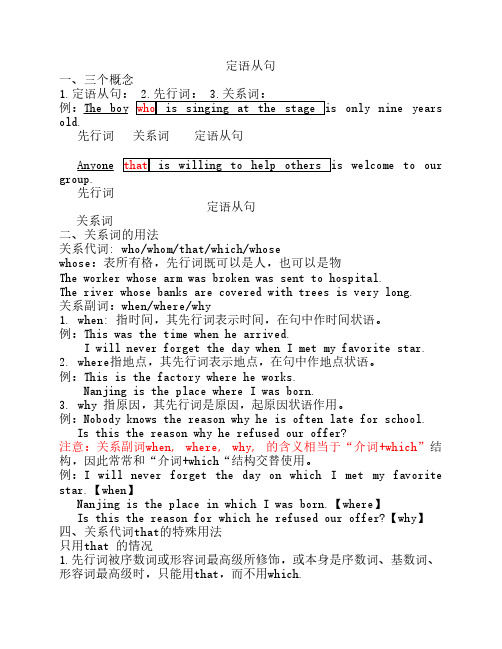
定语从句一、三个概念1.定语从句:2.先行词:3.关系词:例:The boy who is singing at the stage is only nine years old.先行词 关系词 定语从句Anyone that is willing to help others is welcome to our group.先行词定语从句关系词二、关系词的用法关系代词: who/whom/that/which/whosewhose:表所有格,先行词既可以是人,也可以是物The worker whose arm was broken was sent to hospital.The river whose banks are covered with trees is very long.关系副词:when/where/why1. when: 指时间,其先行词表示时间,在句中作时间状语。
例:This was the time when he arrived.I will never forget the day when I met my favorite star.2. where指地点,其先行词表示地点,在句中作地点状语。
例:This is the factory where he works.Nanjing is the place where I was born.3. why 指原因,其先行词是原因,起原因状语作用。
例:Nobody knows the reason why he is often late for school.Is this the reason why he refused our offer?注意:关系副词when, where, why, 的含义相当于“介词+which”结构,因此常常和“介词+which“结构交替使用。
例:I will never forget the day on which I met my favorite star.【when】Nanjing is the place in which I was born.【where】Is this the reason for which he refused our offer?【why】四、关系代词that的特殊用法只用that 的情况1.先行词被序数词或形容词最高级所修饰,或本身是序数词、基数词、形容词最高级时,只能用that,而不用which.例如:He was the first person that passed the exam.2.被修饰的先行词为all, any, much, many, everything, anything, none, the one等不定代词时,只能用that,而不用which.例如:Is there anything that you want to buy in the shop?3.先行词被the only, the very, the same, the last,little, few 等词修饰时,只能用that,而不用which.例如:This is the same bike that I lost.4.先行词里同时含有人或物时,只能用that,而不用which.例如:I can remember well the persons and some pictures that Isaw in the room.5..以who或which引导的特殊疑问句,为避免重复,只能用that.例如:Who is the girl that is crying?6.主句是there be 结构,修饰主语的定语从句用that,而不用which.例如:There is a book on the desk that belongs to Tom.7.先行词在主句和从句中都作表语时,只能用that.例如:He is not the man that he once was.8.先行词是the way时,只用that不用that 的情况1.先行词为that, those时,用which,而不用that.例如:What’s that which is under the desk?2.关系代词前有介词时,一般用which,而不用that.例如:This is the room in which he lives. 这是他居住的房间。
- 1、下载文档前请自行甄别文档内容的完整性,平台不提供额外的编辑、内容补充、找答案等附加服务。
- 2、"仅部分预览"的文档,不可在线预览部分如存在完整性等问题,可反馈申请退款(可完整预览的文档不适用该条件!)。
- 3、如文档侵犯您的权益,请联系客服反馈,我们会尽快为您处理(人工客服工作时间:9:00-18:30)。
1、功能:相当于形容词,修饰名词或代词,在句中作定语一:先行词:被定语从句所修饰的词二:关系代词:用来连接定语从句,并在从句中代表先行词的代词。
先行词是物:which that先行词是人:who whom that在从句中充当的成分:主语、宾语(1)先找关系词,看先行词指的是什么。
(2)看关系词在从句中所充当的成分。
e.g. 把下列每对句子合并成含有定语从句的主从复合句1. They had a radio. It could send out messages.They had a radio which/ that could send out message. (主语)2. The girl is my best friend. She spoke just now.______________________________________________________3. He always buys some books. He never read them.______________________________________________________注意点:1.)定语从句一般直接跟在先行词的后面:e.g. 4. The man who lives next door sells vegetables.The man sells vegetables who lives next door. ( × )5. The car which my uncle just bought was destroyed in the earthquake.The car was destroyed in the earthquake which my uncle just bought. ( × )2.)关系代词在从句中作宾语时可以省略:e.g. 6. The young man ( whom ) you saw was our manager.7. There is something ( that ) we must keep in mind.找出句中的从句并圈出先行词说出关系代词在从句中的成分1. The man who told me the news refused to give me the name.2. The airline has a booklet which will tell you most of the important things about a trip to Europe.3. He found a dollar bill that he had forgotten in a suit .4. He is the man whom we all respect.5. There is somebody who wants to see you.6. The house I would like to buy is not for sale.7. The bicycle my uncle gave me was very expensive.whose 的用法:关系代词与其后的名词构成所有格,即“的”时,它既可以修饰指人的先行词,也可以修饰指物的先行词。
e.g. 1. The girl is my daughter. Her work got the first prize.The girl whose work got the first prize is my daughter.2. The book is not mine. The cover of it is red.The book whose cover is red is not mine ( The book the cover of which is red is not mine)3. Do you know anyone? His family is in Xi’an.________________________________________________________________4. I live in the room. The windows of it face south.________________________________________________________________5. The chair has been repaired. The leg of it was broken.________________________________________________________________限制性定语从句与非限制性定语从句1、限制性定语从句:从句与主句关系密切,去掉从句,主句意义不完整,甚至不合逻辑。
e.g. I was the only person in our office who was invited.(去掉定语从句,意思就不完整)2、非限制性定语从句:从句对先行词关系不密切,去掉定从句,意思仍然完整。
形式上用逗号隔开,不能that用引导。
e.g. Tom’s father, who is over sixty, still works hard day and night.(who引导非限制性定语从句,整个句子可分成两句来翻译)that与which的区别1)用that而不用which的情况①先行词为不定代词all, anything, nothing,,little,few,much something someone;②先行词有最高级修饰,有序数词修饰;③先行词有the only, the very, any,the same , the last等词修饰;④先行词既有人又有物时。
5.避免重复Who is the person that is standing there?e.g. There is nothing that can prevent him from doing it. 没有什么能阻止他不干那件事。
The first place that they visited in Guilin was Elephant Trunk Hill. 在桂林他们所参观的第一个地方是象鼻山。
______________________________________ 这部电影是我看过的最好的一部。
_______________________________________ 史密斯先生是他认识的唯一的外国人。
2)用which而不用that的情况:①引导非限制性定语从句;②指代前面整个主句的意思;③介词+ 关系代词。
e.g. H e had failed in the maths exam, which made his father very angry.This is the room in which my father lived last year.找出句中的从句并圈出先行词说出关系代词在从句中的成分1.What is the address of the factory whose advertisement we noticed the other day.2.I saw some trees whose leaves were black with disease.3.It was a meeting whose importance I didn’t realize at the time.4.The Great Wall was the first place that went to visit while they were in China.5.Miss Smith, who you met at our house, is going to marry Mr. Harry.6.He failed in the exam, which made his classmates surprised.关系代词在从句中作介词宾语时,介词常可以提前,但介词提前时,关系代词只能用which 或whom e.g. 1. The man is a famous runner. You talked to him just now.The man to whom you talk just now is a famous runner.2. The chair is made of wood. He is sitting on it now.The chair on which he is sitting now is made of wood.3. He is a library assistant. I borrowed some books from him._________________________________________________________4. It is a famous school. He graduated from it 3 years ago._________________________________________________________介词的确定应依据定语从句中短语的习惯性搭配,Who is the girl with whom you just shook hands?(shake hands with…是习惯性搭配) 介词常受先行词的制约(即介词和先行词的搭配),He built a telescope through which he could study the skies.(through which 即through the telescope)有一些动词短语中的介词是固定搭配,不可以拆开,(look after take care of look for)e.g. 5. He is the student. / The teachers are looking for him.He is the student who the teachers are looking for.6. The number of the children is 30. / She takes care of the children.The number of the children who she takes care of is 30.找出句中的从句并圈出先行词说出关系代词在从句中的成分1. This is the house about which we wrote to you.2. Wu Dong, with whom I went to the concert, enjoyed it very much.3. He used to live in a big house in front of which grew many banana trees.4. This is Peter in whose house I have lived for five years.关系副词:when where why当先行词是表示时间的名词,用when,在定语从句中充当时间状语,这时一般可以用介词+which 来代替:e.g. 1. I will never forget the day./ I went to university on that day.I will never forget the day when/ on which I went to university.2. He still remember the morning. / The earthquake happened on that morning.______________________________________________________________当先行词是表示地点的名词,用where,在定语从句中充当地点状语,这时一般可以用介词+which 来代替:e.g. 3. This is the house. / He used to live in the house.This is the house where/ in which he used to live.4. I know of a place in which/where we can swim_____________________________________________________________先行词是表示原因的名词,即reason,用why,在定语从句中充当原因状语,这时一般可以用for +which来代替:e.g. 5. I don’t know the reason. / He did it for this reason.I don’t know the reason why/ for which he did it.6. The reason for which/why he was fired was not clear..I will never forget the day _which/that/不填___ we spent together in the countrysideI will never forget the days__during which/when___ we stayed together in the countrysideThis is the reason __that/which/不填_ they told meThis is the reason _for which/why__ he turned the jobf找出句中的从句并圈出先行词说出关系代词在从句中的成分1.I know a forest where you can find wild strawberries.2.Is there any reason why you should have a holiday.3.I will show you the way to the Friendship Hotel where foreign visitors are staying.4.Be sure to call on us next time when you come to town.5.We shall never forget the days when we were united as one to fight against the Japanese.第五讲注意点:要注意判断关系词及关系词在从句中所充当的成分。
